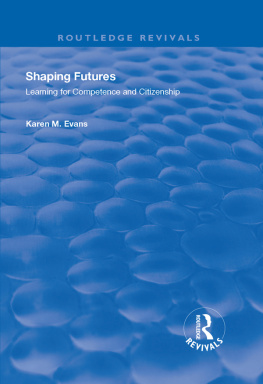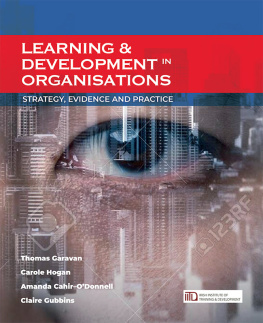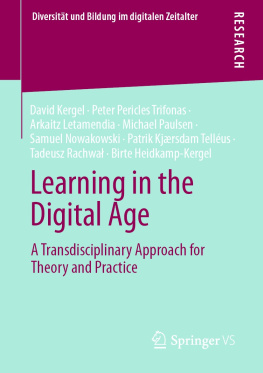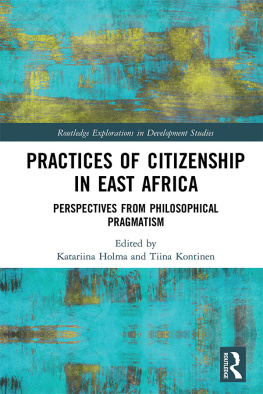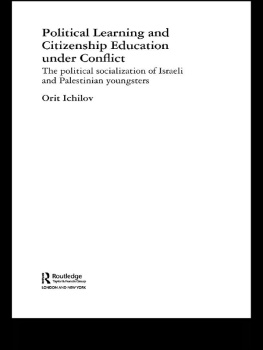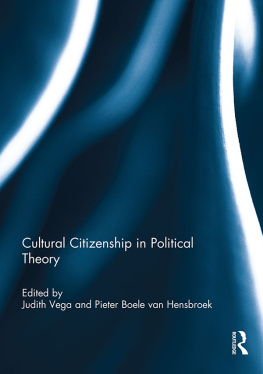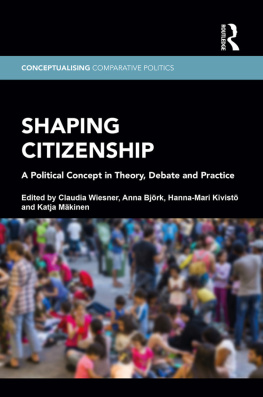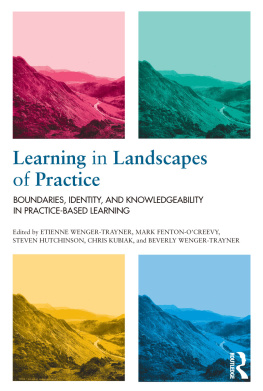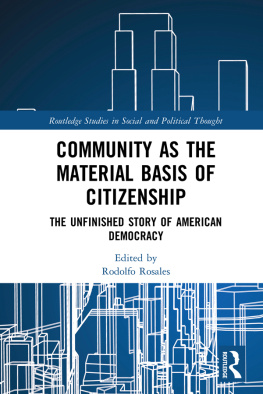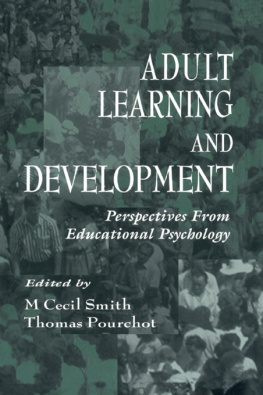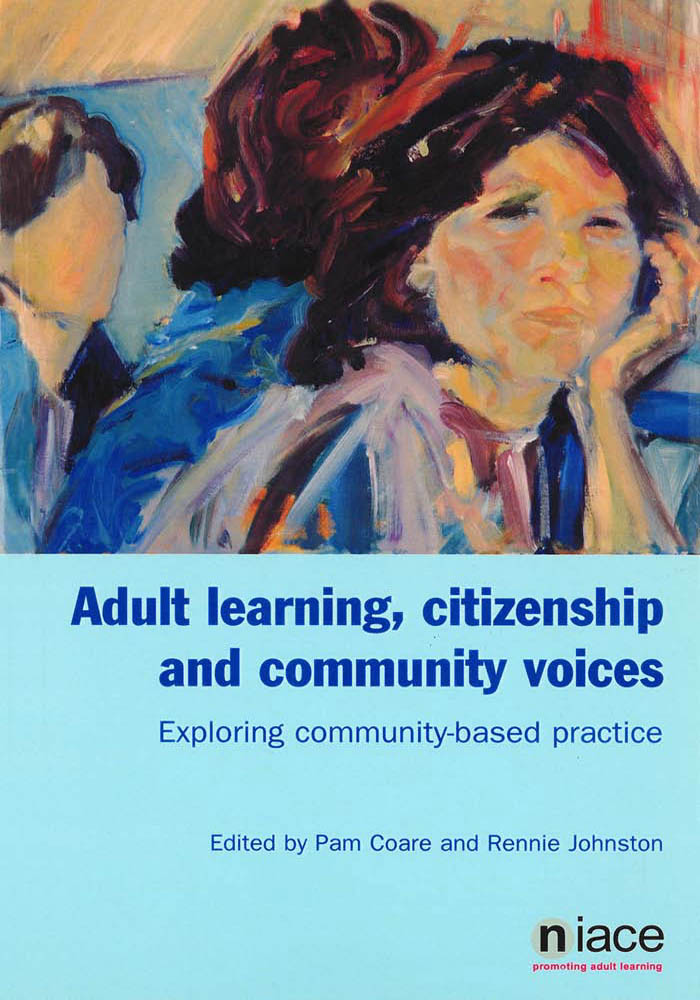Adult learning, citizenship and community voices
Adult learning, citizenship and community voices
Exploring community-based practice
Edited by
Pam Coare and Rennie Johnston

Published by the National Institute of Adult Continuing Education
(England and Wales)
21 De Montfort Street, Leicester, LE1 IGE
Company registration no: 2603322
Charity registration no: 1002775
First published 2003, reprinted 2004, 2005
This collection 2003 NIACE
Each chapter the authors
All rights reserved. No reproduction, copy or transmission of this publication may be made without the written permission of the publishers, save in accordance with the provisions of the Copyright, Designs and Patents Act 1988, or under the terms of any licence permitting limited copying issued by the Copyright Licensing Agency.

NIACE has a broad remit to promote lifelong learning opportunities for adults.
NIACE works to develop increased participation in education and training, particularly for those who do not have easy access because of barriers of class, gender, age, race, language and culture, learning difficulties and disabilities, or insufficient financial resources.
For a full catalogue of NIACEs publications, please visit
http://www.niace.org.uk/publications
Cataloguing in Publications Data
A CIP record for this title is available from the British Library
ISBN 1 86201 160 5
Cover design by: Creative Associates, Oxford
Designed and typeset by: Kolam Information Services Pvt. Ltd, Pondicherry, India
Printed and bound in Great Britain by Antony Rowe, Eastbourne
Contents
Rennie Johnston
Barbara Merrill
Pam Coare
Rennie Johnston
Anne Bellis and Linda Morrice
Niamh Moore
Teresa M Cairns
Ann-Marie Houghton
Steve Dorney and Annabel Hodgson
Margaret Pilkington
Juliet Merrifield
Rennie Johnston and Pam Coare
Rennie Johnston and Pam Coare
Pam Coare and Rennie Johnston
Acknowledgements
The editors would like to thank colleagues, friends and family for the support they have received in their work as adult educators and in the development of this book. We would particularly like to mention all the colleagues who contributed so enthusiastically to the book, the voices who generously gave us their time and their ideas, as well as Caroline Barnard, Roseanne Benn, Mike Boice, Julia Dinsdale, John Gaventa, Fred Gray, Colin Holliday, River Jones, Sue Long, Sonia Plato, Sarah Playforth, Mark Ravenhall, John Robbins, John Robinson, Mary Stuart and Sue Webb.
Introduction
The way we define citizenship is intimately linked to the kind of society and political community we want. (Chantal Mouffe 1992: 25)
Political parties of all colours are using the citizenship debate to define not simply our rights as citizens but, more significantly, our responsibilities. This is set against a background of decline in participation in the democratic process in both Europe and the USA. National boundaries do not reflect new European identities, and the breakup of Eastern Europe has precipitated mass population movements, swelled by the ranks of economic migrants who aspire to the economic opportunities offered by the affluent West. This book aims therefore to explore different notions of citizenship and the ways in which adult education practitioners might be involved in supporting active citizens.
The book seeks to offer a broad view of current debates around citizenship and to look towards the engagement of adult educators in moving forward the citizenship agenda. From its conception, the editors have been concerned to offer a book that is intended to identify, analyse and learn from the voices of a range of citizens (whose experience and ideas challenge conventional ideas of citizenship) and promote adult learning in community contexts, albeit framed within a broad understanding of global issues about citizenship and learning. The book sets out to link theory and policy to practice in a critical but practical way and to suggest a framework for analysing and developing adult learning for citizenship.
What are our starting points and who is the book for?
The contributors to this book all share a broad commitment to social purpose adult education with its baseline values of social justice, greater social and economic equality, its promotion of a critical democracy and its a vision of a better, fairer world where education has a key role to play. We think this is a position which many people can relate to sympathetically. Importantly, this is our starting point from which to engage with the interrelationship between citizenship and learning. From this starting point, we want to develop in this book a debate based on theory and practice and to engage with as wide a range as possible of people interested in learning for citizenship, whether you share our values and starting points or not, whether your interest is job-related/professional or not, whether you call yourselves educators or not we dont want to talk merely to ourselves or to people like us.
Contributors and ways of working
We have tried to include a range of practitioner voices in the book, drawing on a wide variety of experience and expertise. However, there are difficulties in working in this way. Many of the colleagues who have contributed to the book are employed in their institutions on part-time contracts that do not allow for paid time to undertake research. In this instance we have been fortunate in having a small amount of European Social Funding, which has allowed a limited amount of financial support to be offered. However, part-time portfolio work of the kind that many adult educators now endure often makes it impossible for such important voices to be heard in the research community. The research culture of higher education makes it easier to undertake such work, as many of us are sustained by institutional cultures and supportive colleagues: this is not the case in the voluntary or other statutory sectors.
Working with colleagues from different backgrounds and situations poses problems around how they accommodate the demands of academic publishing and use a voice that is not their own. Our approach to this has taken several different forms. In two instances, chapters were written jointly by a practitioner in the field and a practitioner/academic with different tasks shared out between them and the final product owned by both; in another, the work and voice of those close to a particular community of interest were located within the academic framework of a more experienced writer with her own extensive but different knowledge of that community; in other instances, those with more conventional academic credentials and attachments were actively involved in adult education practice across a range of contexts and were able to bridge the gap between experience and more academic writing. In addition, all contributors were able to meet as a group for a day to talk about their different subjects and approaches, to identify and explore interconnections between them and to discuss their links with the more theoretical first section of the book, particularly the initial framework set out in Chapter 4. This dialogue subsequently informed the development of Section III of the book which attempts to link theory, (policy) and practice as a basis for the further development of adult learning for citizenship. These are approaches which need to be explored and developed if a diversity of voices are to be heard that can influence practice.


